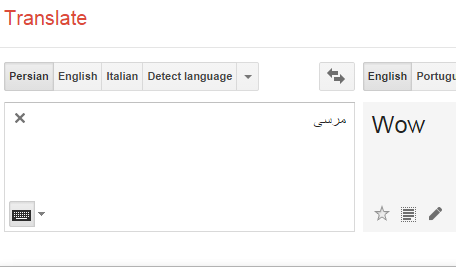
As I’ve mentioned in previous posts, I’ve recently restarted studying Persian, a language that I wanted to learn years ago but have let slide.
There aren’t a lot of online resources for learning Persian, so I often find that I’m working with examples that are either introductory or a little above my (very basic) level. When the latter happens, I have to look up translations elsewhere. What’s odd is that in 2014, there aren’t a lot of good free translation tools online, even for very basic expressions.

Google Translation is sort of hit or miss, depending on the language. For commonly spoken European languages, it does a decent job of getting basic points across. Even there, though, it stumbles. Adrien Ecoffet has a great answer on Quora about how it uses English as an intermediary between languages, which loses valuable information (such as register) that should be easy to translate if you go directly between the source and target languages.
What’s crazy is how bad it is with simple word-to-word translations involving other languages. The screenshot at the top of this post is of an attempt to translate the word “thanks” from Persian to English. Although it’s actually a French word, Iranians often use “merci.” Maybe people also use it to express surprise. I doubt it, but if that’s the case, Google should at least include the more common meaning. In other cases, it simply guesses at the subject of sentences, which is odd because Persian verb conjugations can tell you a lot about the grammatical subject in most cases.
Bing Translator offers slightly different but also also unnatural Persian-English translations. Strangely, it agrees that the only translation of merci is wow, which makes me wonder if they use the same dictionary or intermediary language for this language combination. Facebook’s translations of even widely spoken languages are equally perplexing.
I imagine that I’ll receive some responses to this post with suggestions for other translation services. That’s great, and I would love to hear about them. But what I wonder is why large tech companies (such as Microsoft or Google) fail on even rudimentary translation services. It’s not a problem for Persian alone: the internet abounds with terrible translations to and from other non-European languages. I’d love to see them develop more machine learning tools that can adapt to previous interactions and produce workable translations for basic interactions.